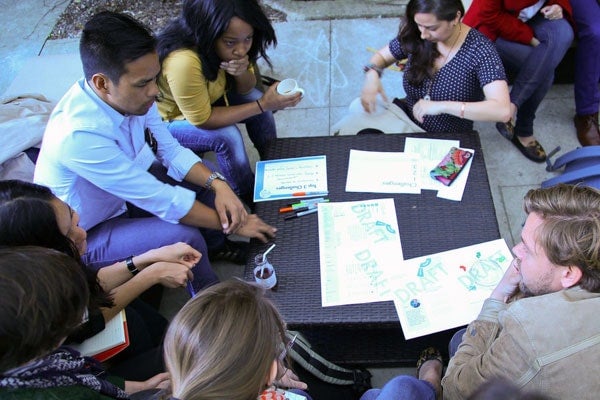
Youthful cities: international gathering brings young urban activists to U of T
Published: May 4, 2015
Young leaders from around the globe gathered together at the University of Toronto last week united by their passion for cities – and excited over hefty topics such as post-secondary education, mental health, safety and transit.
The five-day summit organized by Toronto-based Youthful Cities gave young delegates a chance to interact with well-known U of T urban scholars such as the geography department’s Deborah Cowen and social work’s David Hulchanski, whose findings about income polarization in Toronto are having a profound impact on the city. They also heard from Ontario’s minister of children and youth services, Tracy MacCharles, and U of T urban studies expert Shauna Brail about internships her U of T students are working on as well as work opportunities for youth arising from the redevelopment of Regent Park.
At the summit, youth from around the world spoke about cities with U of T News reporter Brianna Goldberg. Listen to their conversation at The Cities Podcast.
(Click the down-pointing arrow button in the player to download episode and transfer to your listening device. Transcript available here. Also available on iTunes and The Cities Podcast home)
Last year, Youthful Cities named Toronto as the most youth-friendly city in the world. The group, which says it seeks to encourage young people to be drivers of change in their cities, measures the performance of 55 cities by examining indicators such as transit, employment and sports – from the perspective of people aged 15 to 29.
At the end of this year’s summit, Youthful Cities announced a new #1 youth-centred city: for 2015, it’s New York City. But Youthful Cities organizers said Toronto received the highest grades in diversity of languages, food from other cultures, openness to LGBQT rights, religion and gender equality. The city also performed well in health, education, film and music – but it scored poorly in civic engagement among youth.
Sonja Miokovic, co-founder of Youthful Cities, said the index looks at how many young people are involved in city government through advisory roles in youth councils. Compared to other global cities that are seeking input from hundreds of youth leaders, the city of Toronto only has about 30 young people sitting on the City Youth Council of Toronto, Miokovic said.
“We’re hoping the index inspires municipalities to engage in relationships with their youth population,” she added.
But Brail believes youth are engaged in the city.
At Regent Park, about 30 young people have been hired as youth outreach workers and there are similar efforts at other community housing projects, Brail says. And this past weekend several young people, including high school students, led Jane’s Walks.
“A big part of measuring youth engagement is how we’re counting it,” Brail said. “I think we’re at the greatest level of youth engagement around city building than we’ve ever been at. If you look at grassroots initiatives, efforts at the university with our students involved in various city internships and working with community and neighbourhood groups, and at high school initiatives, we’re actually doing a lot with youth engagement.”
Miokovic hopes efforts like the summit, bringing together young people from around the world to talk about city issues, will spur more youth engagement.
The summit brought together 100 young delegates – some university students, others recent grads – from places such as Nairobi, Berlin and Warsaw as well as Toronto.
Students explored downtown neighbourhoods such as Kensington Market and the King and Spadina area. They also delved deeply into topics like youth employment, entrepreneurship and financial access, trying to explore solutions to the challenges they face.
Michael Mousa, a third-year civil engineering student at U of T, works on campus as part of the Student Life community crew, helping new students adjust to the university. Mousa said being a delegate at the summit allowed him to meet and network with amazing people from around the globe who are creating companies that are addressing everything from building efficiencies to developing new education initiatives in Korea and creating folding bicycles.
“The biggest thing for me has been meeting so many people who are so young and so inspirational,” Mousa said. “They make me want to get more involved. We’re from all over the world, and yet there are so many similarities. We all live in big cities, and we want to make the best of them.”
Noreen Ahmed-Ullah writes about strengthening cities and building communities for U of T News.



